UA-131743538-2
david taylor kaye
Poker Professional
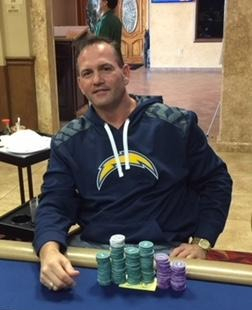
Professional poker player
DAVID T. KAYE
(DIAMOND DAVE)
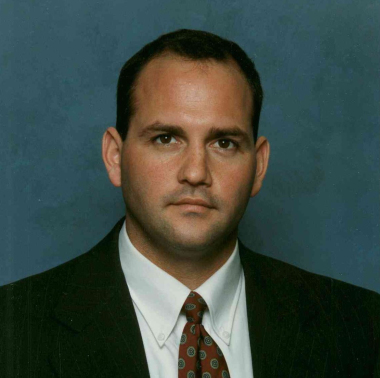
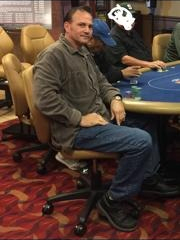
Diamond Dave is a legendary poker play but he wasn't born with chips or cards in his playpen and didn't even start playing poker until thirty years ago. Diamond Dave was previously know as David T. Kaye www.attorneykaye.com and was a trial attorney. David Kaye is a graduate of the University of California, San Diego, with a Bachelors of Arts degree in Economics. He obtained his law degree from Western State University in 1993, and was admitted to the California State Bar in 1994. He subsequently sought admission and was accepted into the United States District Court, Southern District. Mr. Kaye worked as a Law Clerk for a Superior Court Judge in Orange County, and worked as a Law Clerk for the Office of the United States Attorney in San Diego. He then served as a Deputy District Attorney in Tulare County located in Central California. Mr. Kaye left the public sector and established a private practice limited to Family Law and Criminal Law, with an emphasis on trial work. For thirteen years Mr. Kaye was Of Counsel with the Law Offices of Myles L. Berman and represented many clients at trial. Myles L. Berman operates one of the premier DUI defense firms in California and works under the trade name Top Gun DUI Defense Attorney with several offices throughtout Southern California. www.topgundui.com Mr. Kaye also was trial counsel for the Law Offices of Eugene Ellis for nearly a decade. Eugene Ellis is located in San Diego and works under the trade name Mr. DUI. This is one of the most well known and respected DUI firms in San Deigo. www.mrdui.com Mr. Kaye has been active in the legal community and served four years as Co-Chairman of the Criminal Section of the San Diego North County Bar Association. Mr. Kaye has represented more than 4,000 criminal clients and has personally tried more than 250 jury trials throughout every County in Southern California. He was routinely retained by other law firms to represent their clients at trial. David Kaye left the legal community and wrote a book about jury trials entitled Jury Nullified. www.thecoastnews.com Feature articles have been written about the book and it has been very successful and has been well received. Diamond Dave has been playing poker for over thirty years and turned professional in 2015 and retired as an attorney.
Diamond Dave is a Las Vegas based player who only plays tournament poker - Texas no limit hold-em.
I never play cash poker! For me cash poker has no beginning, or middle, or end. If you win a little cash you can walk away or continue to play. If you correctly call a bluff, you win some cash. If you call a bluff and you're wrong, you lose some cash. But the only consequence in a cash game is that you just pull out some more cash from your wallet. I have no interest in cash poker because there is far less strategy or competition to it. Typically, cash players do not make good tournament players because they call too many hands, and bluff too much, and they limp in with too many hands. All of these tendencies cost them vital chips. Tournament poker is very unforgiving. When your chips are gone so are you!
I love poker because of the challenge, the strategies, the complexities of the game, and the social aspects of the game.
I have had many successes in poker and I am a nationally ranked player in the top 1%. I was regularly one of the top ranked players in my local casino in my home town before moving to Las vegas, and was the origial Top Dog winner ($15,000.00) which was a year long competition at the casino back in the day. I have placed in the money at several Word Series of Poker Events and World Poker Tour events.
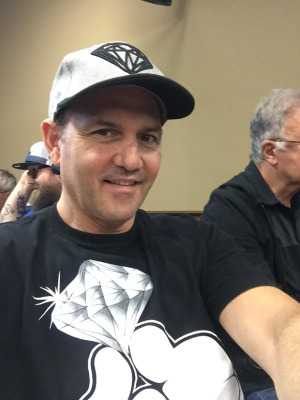
POKER CHIPS:
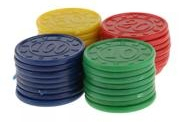
Poker chips are as varied as potato chips. If you want to learn the game or host a home game, make sure you buy some good quality clay chips that are at least 10gram in weight. The cheap plastic chips look and feel cheap. Besides, how can you practice all your fancy table chip shuffling techniques with the wrong chips. In addition, if you spend a little more on that chip set you will get more chips so that you can accomodate more players for the home game.
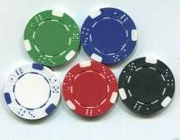
Home Game Cheating:
If you get invited to play at a home game it might be because you are so likable that people just find it a joy to have you around. But it also might be that they want to increase the prize pool and believe that they are more likely to win that money because they perceive themselves to be a better player. It also could be that they intend to cheat you at the home game.
If you are playing for money at your home game then everyone will be tempted to cheat. Most will resist the temptation, but some may not. When you play at a casino they have countless meaures and protocals to prevent and catch cheaters such as cameras and counting the cards to ensure there are always 52 cards.
The ways to cheat are as limitless as the imagination. Here are some examples:
- Using trick cards where the cheater can read the backs of the cards to identify your specific cards.
- Marking cars with ink or depressions with a fingernail. Every Ace might have a smudge of ink or a crease in the corner.
- Players signaling to each other as to the cards they possess or folded.
- Players taking actions designed to influence the action like raising only to induce the victim of the cheating to take an action.
- Introducing extra cards to make a better poker hand.
- Removing cards like removing all the Aces so that the cheater knows that having a King is the best possible hand.
- Cheaters sharing or exchanging cards to improve their hand.
- Splashing the pot with chips to disguise that they have less than the correct amount.
There are a countless number of ways to cheat in poker and so playing at a casino offers protection for you and the game.
How common is casino cheating? Every casino maintains books of players who have been banned for cheating. The books are literally the size of a phone books. So how likely is it that you might be cheated in a home game?
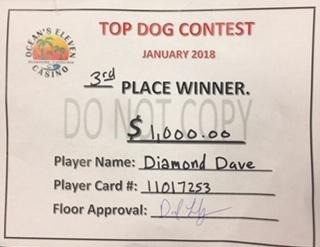
Tournament Structure
Poker players often discuss deciding which tournaments to play based upon the tournament structure. The concern is always skill versus luck. More chips, more levels, and longer levels will always benefit the more skilled player. In the short run, the amateur luck players can always get lucky with good cards, good flops, or hyper aggressive play, but in the long run the skilled players will always come out ahead. So skilled players do not like to play small chip stack tournaments with quickly escalating blinds, and twelve or fifteen minute levels because they are forced to "gamble" with the luck players. It's just like Vegas! Anyone can have a lucky streak in Vegas but in the long run the house will always win because of the mathematical advantage they have on all the games. If you play long enough in Vegas you will always lose, just like the amatuer poker player against the professional. Professional poker players make much better descisons throughout the game which gives them a mathematical advantage that can not be beaten in the long run.
Let me give you an example of how a professional poker players thinks. Let's say an amatuer player makes a standard raise (three times the big blind) with AQ. The professional calls with AK of spades. The flop is Q 9 4 with two spades. The amatuers goes "all in" because he is overly excited that he paired his Queen with an Ace kicker. He never even thinks for a moment that he might just want to make a large bet instead and is risking all of his chips and the pro might have pocket 9's, 4's, Kings, or Aces. The professional first looks to see how much the amatuer has in chips because that's a huge factor in deciding how much of his chips to risk. The amateur has almost the same amount as the professional so this could be a tournament ending decision. The professional reasons that the amateur probably hit the queen and is going all in because of the fear of spades. However, the poker pro also reasons that the amater raised pre-flop, so he might have AQ or KQ. So even if an Ace or King comes on the turn or the river the amateur might still have the best hand. So the professional knows that he probably needs another spade to make a flush and there are only a maximum of nine possible spades left in the deck of cards. So in a ten handed game there 29 cards left in the deck with a maximum of 9 of those cards being spades. The pro knows that he has a maximum of a 31% chance (9/29=.3103) of catching another spade to win the hand and double his chip stack. The poker player rejects the 31% poor choice and folds his hand and lives to play many more hands. If you consistently make poor choices and risk your entire chip stack when you are mathematicaly behind and only have a 31% chance of winning you are virtually guaranteed to lose in the long run.
In contrast, an amateur player would love this gamble. An amateur would welcome the gamble of hitting a 31% flush draw and would foolishly risk all of their tournament chips on this bad bet. And in addition, an amateur player would think that since there is only a Queen on the flop then their Ace or King is still a live card and would give them the best hand if one of these cards came on the turn or the river. They would be oblivious to the fact that the other player raised pre-flop and might have AQ or KQ. They would see this as 15 outs (3 non-spade aces and 3 non-spade kings) with 29 cards remaining and they would risk all their chips. Bad decisions means bad results.
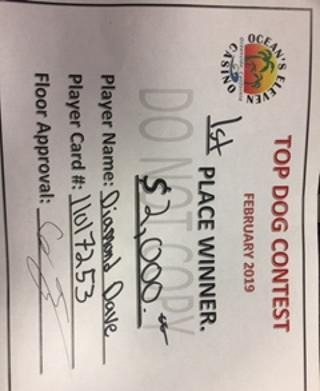
When to raise?
Deciding when to raise is a very important part of the game. There are exception to EVERY rule in life but in general you should raise in the following situations:
1) Raise when you you believe you have the best hand. Many times a player with an inferior hand will flop, or turn, or river a better hand, but mathematically you will win with the best pre-flop two cards more often than not and so raising when you have the best hand means you will win more chips when when you have a mathematical advantage to win. It's very similar to card counting at blackjack. You increase your wager when the deck is "10 rich" because you know you have a mathematical advantage and you want to win more often when your bets are larger.
2) Many times you want to raise to limit the number of other players who see a flop. For example, if you have pocket two's and you see a flop with four other players you are very likely to lose the hand because it's more likely that another player will make a higher pair. If you raise and see a flop with just one other player you are far more likely to win the hand because it's far less likely that the one other player will make a pair.
3) You might raise to immediately force all other players to fold so that you can win the blinds and antes and any other bets made by other players who acted before you.
4) You might want to raise as a bluff to send a message to other players that you have a very good hand. For example, if you raise with "7" "2" and the flop is "A" "k" "6" you could make a bluff bet and the other player might fold to you BECAUSE you raised pre-flop making them believe that you actually have an Ace or a King, while you really only have a "7" and "2". Of course if the flop is "7" "3" "2" you are likely to earn some chips because your hand is so well disguised due to the pre-flop raise. Bet slow because they might assume you have pocket 7's or 3's, or 2's if you bet big after a pre-flop raise.


